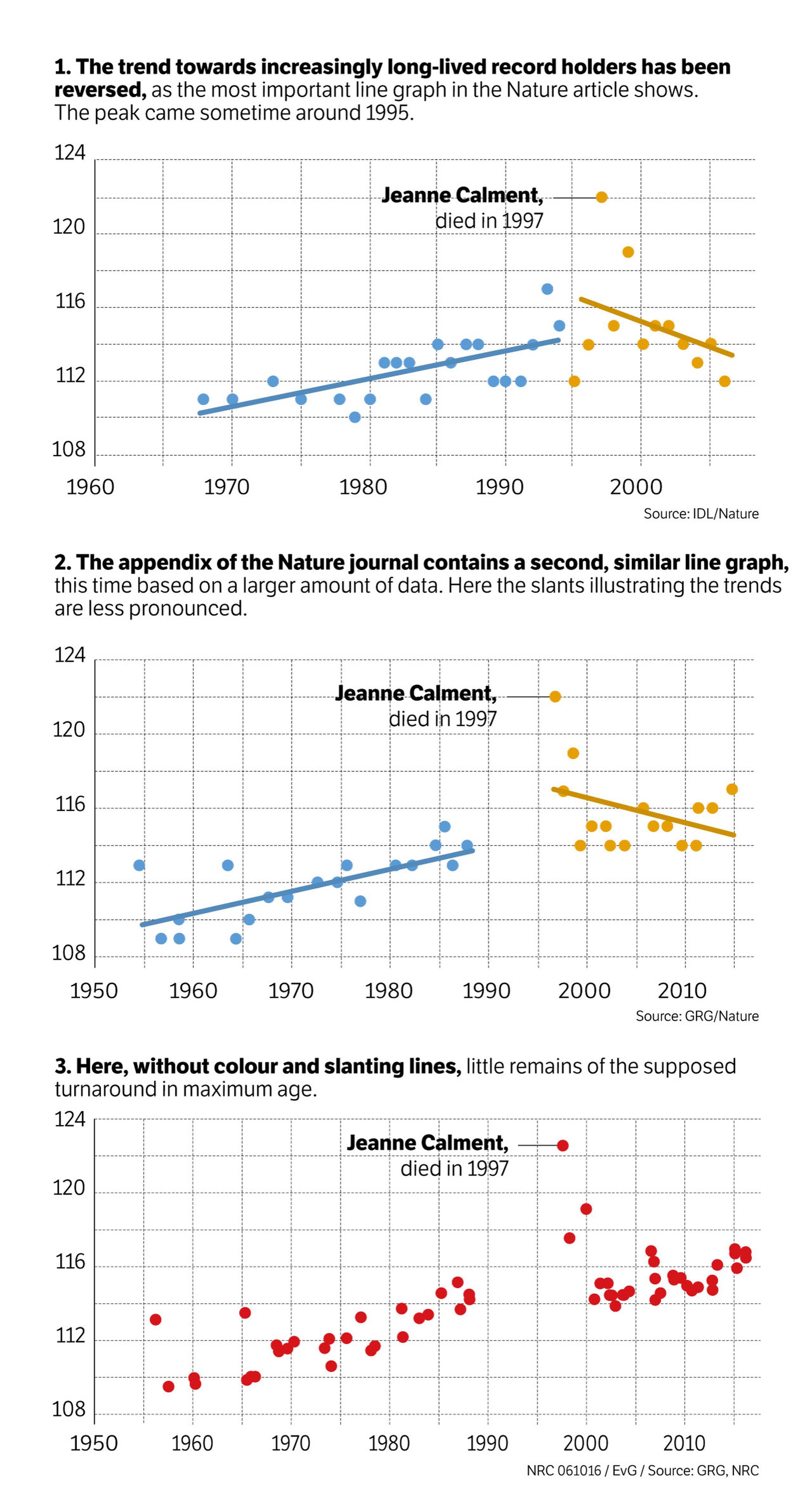Consensus Arguably Lacking : Life Expectancy Expectations
"We never had so many centenarians as we have now. Maybe we can actually live much longer than 100. Maybe this goes on and on and on." [speculation]
"We cannot break through that ceiling. The take-home message essentially is this whole ever-increasing life expectancy of humans cannot go on." [conclusion]
"Every year we looked at who was the one who died in that year and was the oldest human in existence, [analysis of decades of worldwide longevity records]."
"If we would have 10,000 worlds like ours, only one individual across all these 10,000 worlds would reach 125 in any given year. The take-home lesson from what we found is that the human species most likely has a maximum life span of about 115 and we cannot break through that ceiling, at least not as far as we now know."
Jan Vijg, molecular geneticist, Albert Einstein College of Medicine, New York
"Right now, all we're doing is we're combating one disease at a time: heart disease, cancer, stroke."
"It's like a game of whack-a-mole. You know: One disease goes down another comes up."
"The chances are very high that we [have] really reached our maximum allotted lifespan for the first time [in human history]."
"[For] the oldest old people, we are still not very good at reducing their mortality rates."
"Based on the data we have now, the chance that you will ever see a person of 125 [years] in a given year is about 1 in 10,000."
S. Jay Olshansky, University of Illinois, report co-author
 |
| The researchers found that the maximum age at death rapidly increased between 1970 and the early 1990s. But in the mid-to-late 90s, a plateau was reached. Photograph: Frances M. Roberts/Alam |
"There seems to be a wall of mortality that modern medicine cannot overcome'"
"If you die from heart disease at 70, then the rest of your body might still be in relatively good health. So, a medical intervention to overcome heart disease can significantly prolong your lifespan." "However, in centenarians not just the heart, but all bodily systems, have become aged and frail. If you do not die from heart disease, you die from something else."
"[The sole approach that has promise is in slowing down the ageing process:] It is, however, not yet clear if and how this can be accomplished."
Henne Holstege, VU University, Amsterdam, Studying ageing of centenarians
"There is no set programme for ageing and we know that the process, which is ultimately driven by the build-up of faults and damage in the cells and organs of the body, is to some degree malleable." "Even without any change in the biology of ageing, it is almost inevitable that the current record [of 122, of Frenchwoman Jeanne Calment] will be broken."
Tom Kirkwood, associate dean for ageing. Newcastle University
 |
How many birthdays can you celebrate? Researchers calculated 125 years as the absolute limit of human lifespan.
Credit: © WavebreakMediaMicro / Fotolia
|
"No one, particularly not evolutionary theorists, predicted that single-gene mutations could slow the aging process and double the lifespans of animals. But they can."
"While we don’t have demographic data supporting the idea that the maximum human lifespan is now increasing, that certainly doesn’t mean it’s impossible."
Cynthia Kenyon, vice president of ageing research, University of Colorado, Boulder
There are both scientific pessimists and optimists on the issue of human longevity. Most people living today likely fall into the category of hopefully optimistic, that some genius will suddenly stumble upon a formula for extending life far beyond what present-day expectations are. After all, in the past Century human life has seen an elongation in years allotted to people fortunate enough to live in
good climates in advanced societies where health care and medical advances have contributed hugely to the length of time a human body can withstand the stressors of time and fatigue of living cells.
Drs. Jan Vijg and S. Jay Olshansky, ageing expert at the Albert Einstein College of Medicine in New York and professor of public health at University of Illinois, Chicago respectively, jointly reached the conclusion that there is a genetic limit beyond which humans cannot aspire to challenge time and the decay of the human body. Together they conducted research which they feel to be all-encompassing to garner data to aid them in reaching their conclusion that human longevity will never transcend age 115.
The report that developed from their research has been published in the prestigious journal Nature, and it has engendered disappointment among the general public, while eliciting denials from other scientists involved in the study of human ageing and its potential for the future. "It all tells a very compelling story that there's some sort of limit", stated Dr. Olshansky for whom this argument and its conclusion has stuck with him for the last 25 years, now further validated.
On the other hand, James W. Vaupel, director of the Max-Planck Odense Center on the Biodemography of Aging rejects any such suggestion, that humans have reached a limit to their life- span potential. As far as he is concerned, the recently published study represents a travesty in its conclusion. "It is disheartening how many times the same mistake can be made in science and published in respected journals", he charged.
He cites trends in survival that have been tracked since 1900 when a child born in the United States in that year could be foreseen to have an average life expectancy just under fifty years. A sharp contrast to that same American child born in 2016 who can expect his life to chug along to an average of age 79. Japan's statistics stand as the star among all other nations, where the average life expectancy at birth is now 83 years.
Dr. Vijg and his students examined data on survival and mortality, recognizing a pattern that seemed to stand out. While the fastest-growing proportion of human society has been in its elderly, as the average life expectancy became longer, the peak began to shift so that by the 1990s the fastest growing group of Frenchwomen, as example, was those in their 102th year. But the trend appeared to diverge; had it not, that swiftest growing demographic could now represent 110-year-olds.
Rather, the steady increases appeared to have wavered as it progressively slowed down, and then appeared to have come to a stop. The same trend appeared visible to Dr. Vijg in the presentation of data coming from 40 other countries. That slow-down evidently began in the 1980s. Dr. Vijg ventures the theory that this was so, simply as a result of humans reaching an upper limit to their prolonged years in longevity.
The oldest age of advanced elder maturity was 111 by 1968 and by the 1990s the oldest demographic had increased to about 115, and that is when the trend came to an abrupt halt. Thereafter, with rare exceptions like Jeanne Calment who in 1997 died in a nursing home in France at age 122 -- a record for human longevity -- there has arisen no one else to have lived so extensively beyond 115. On the researchers' graph, Dr. Vijg stated, Mrs. Calment is "clearly an outlier".
"I honestly don’t get it. Nature should never have published this. I see a continuous line, one that moves upward."Wishful thinking, or hard facts? Take your pick!
"All the available data says that the oldest individuals still living just keep getting older – and are in better condition as well."
"Vijg is focusing only on the small group that achieves extreme longevity; it’s like looking at Olympic medallist Sven Kramer and drawing conclusions about the development of Dutch speedskating. Studies that examine a much larger pool of people in advanced old age show that the life expectancy of people, even the very oldest, continues to increase."
Rudi Westendorp, formerly Professor of Geriatric Medicine in Leiden, now Professor of Healthy Ageing, University of Copenhagen

Labels: Ageing, Health, Life Expectancy

0 Comments:
Post a Comment
<< Home